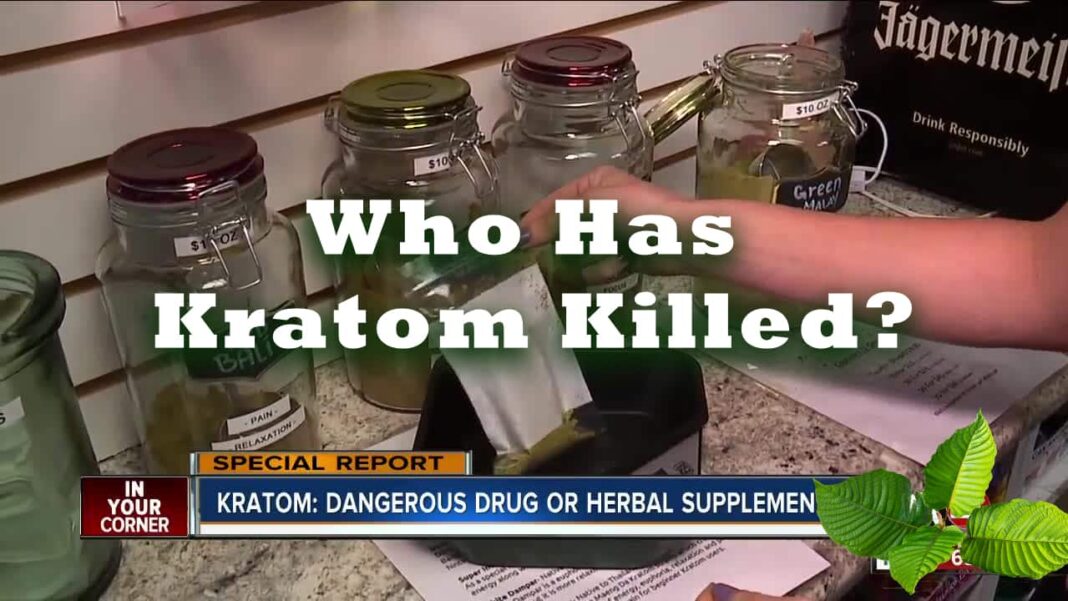Short answer: No one.
By itself, kratom has never resulted in a single fatality. It’s only when a person mixes kratom with hard core narcotics. Of the substances that were found alongside kratom, fentanyl was found in most instances, followed by heroin, benzodiazepines, prescription opioids, and cocaine. cocaine. It’s when a person tosses some kratom into the mix of hard drugs that death becomes a possibility, and the individual may have died anyway, without the kratom being added to their system.
But Big Pharma, fearing the popularity of kratom as a threat to their profits from dangerous opioid medicines, influences the mainstream media. Big Pharma wants people to avoid kratom. They demonize it like they demonized cannabis.
It’s especially disgusting, all this misinformation, when you realize that Big Pharma has been fraudulent in their representation of various drugs, telling the FDA that they’re perfectly harmless and nothing to worry about, when it’s a total lie. The FDA relies on the testing of the big drug companies when it comes to medicines for people over 21 years old. So you see how a bias enters into the picture here.
For example, Purdue Pharmaceuticals in the 1990s promoted Oxycontin as safe and non-addictive. Doctors went along with this propaganda presented to them in the hyper-aggressive “Get in the Swing with Oxycontin” campaigns. Over-prescribing Oxycontin (along with Vicodin, Percocet, Narco, and other dangerous narcotics) has now resulted in the misery of the opioid crisis.
So the very “authorities” who are condemning kratom as dangerous are the same charlatans who pushed opioids on the American public. Purdue even has been caught issuing memos that said when patients get hooked on Oxycontin and demand more of it, the doctors should blame the addicted Oxycontin users as depraved, low life losers who are always seeking to abuse narcotics for a euphoric thrill.
It makes no sense to trust what Big Pharma, the FDA, and mainstream media say about kratom.
Now, there will always be unfortunate individuals who have fallen so far into gloom and despair, they will try to commit suicide by attempting to overdose on whatever substance they can get their hands on. The most dangerous drug in most people’s medicine cabinet is Tylenol. But some people may try to take way too much kratom in order to end their depressed lives.
Overdosing on kratom, to a fatal extreme, is nearly impossible. You’d have to take a super huge amount of it and, chances are, your stomach would rebel and cause you to vomit before the kratom had a chance to hurt you. Sometimes just taking a heaping teaspoon of kratom can cause a person to throw it all up, due to washing it down with soda pop, or the kratom went down the wrong tube.
In spite of all this, mainstream media, which gets massive ad revenue from pharmaceutical company products, is very much aligned with the anti-kratom forces.
So you’ll probably see reports that hysterically blame kratom for a death, when it’s not necessarily true that kratom had anything at all to do with it. This shows you how dishonest Big Pharma and the FDA are — and how desperate they are to paint a bad picture of kratom.
Huffington Post states in a Feb. 7, 2018 article entitled “FDA Releases Kratom Death Data, Undermines Its Own Claims About Drug’s Deadly Harms“:
“The FDA says the incidents “underscore the serious and sometimes deadly risks” of kratom, but the list contains a number of events in which kratom played an uncertain role, including a case in which a teenager hanged himself, and another in which a drug overdose victim tested positive for 9 different substances.
As a whole, the data suggests the FDA is basing its warnings about kratom’s fatal harms on a patchwork of loosely sourced anecdotal reports that say very little about how the drug is responsible for the fatalities ― or even whether it is at all….
Almost all of the FDA’s cases involve subjects who were found to be on multiple substances at the time of their death, with the vast majority including either illicit or prescription drugs that carry well-known fatal risks….
Just one of the FDA’s cases appears to involve the presence of kratom alone, though the report includes no information on the death apart from the subject’s age and ethnicity. The report shows the individual tested positive for high levels of mitragynine, but as in the rest of the cases, says nothing about how the substance was determined to have contributed to his death. The FDA denied HuffPost’s request for additional information on that case….
Taken together, the FDA case reports provide no clear picture of the “deadly risks” the agency claims kratom poses. There’s also a certain irony in the fact that so many of the deaths the FDA associates with kratom also appear to have involved prescription drugs, which it argues must be safer than kratom….
Some drug policy experts and a handful of Congressional lawmakers have said the damage caused by forcing people away from kratom, and possibly back onto other prescription or illicit drugs, would far outweigh the current harms. Furthermore, if kratom were to be banned, many individuals would simply continue buying and using it illegally. If feds are worried about controlling kratom now, driving it onto the black market will only make that harder.”
Here are some examples of biased reports trying to frighten people away from kratom:
USA Today – Herbal Drug Kratom Linked to Almost 100 Overdose Deaths, CDC Says
CNN – More deaths have been associated with kratom than previously known
CBS News – Kratom is Linked to More Overdose Deaths than Previously Reported
Time – An Herbal Drug Called Kratom has Been Linked to Almost 100 Overdose Deaths, The CDC Report
But the New York Times, in an article titled, Opioid Users Call Kratom a Godsend. The FDA Says It’s a Menace, reveals the weakness in the CDC’s position, and even mentions the alarming rate of deaths from opioids.
“The new report is the highest tally yet of deaths in the United States where kratom is said to have been a factor. But the numbers pale compared to the death toll from opioids: almost 48,000 in 2017, according to federal data.
The American Kratom Association has released a PDF report that debunks the FDA’s ridiculous claims against kratom: “The FDA Kratom Death Data: Exaggerated Claims, Discredited Research, and Distorted Data Fail to Meet the Evidentiary Standard for Placing Kratom as a Schedule I Controlled Substance” by Jane Babin, Ph.D., Esq. University of San Diego School of Law, J.D. Purdue University, Ph.D., Molecular Biology.
In their report, the AKA states the following facts:
“The FDA points to 9 deaths in Sweden between 2009 and 2010 to support its claim of deaths associated with kratom use, but an independent scientific review of those cases concluded that the deaths were the result of spiking powdered kratom leaves with a lethal concentration of the mu opioid receptor agonist O-desmethyltramadoli.
Each of the remaining deaths attributed to kratom by the FDA have equally suspect association with kratom.
Nearly all of the decedents [persons who have died] were using multiple substances, and most included illicit or prescription drugs that carry well-known risks of fatalities.
Notable cases include a decedent [person who died] who had hanged himself after struggling with depression and prescription drug abuse; a “death by homicide” resulting from a gunshot wound to the chest; and a man who had fallen out of a window, broken his arm and refused medical treatment before dying.
Many of the case reports were not the reported as the result of FDA investigation, but were previously disclosed in the scientific literature; and as many as one third were deaths that did not occur in the U.S..
The FDA claims it has released a total of 36 case reports (only 26 appear to have any data), and claims it plans to release the additional 8 case reports in the near future.
None of the released case reports provides a cohesive or reasonable scientific basis to conclude any of the deaths was caused by kratom, nor does the information released conclusively support any conclusion that kratom was associated to the cited death other than coincidentally.
Only one case report released by the FDA suggests that the only substance detected in the decedent’s blood was kratom, but that report provides no substantive detail other than the decedent’s age and ethnicity to support that suggestion.”


